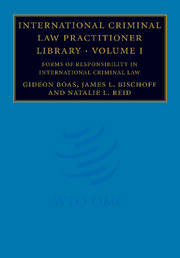Book contents
- Frontmatter
- Contents
- Foreword
- Table of authorities
- 1 Introduction
- 2 Joint criminal enterprise
- 3 Superior responsibility
- 4 Complicity and aiding and abetting
- 5 Planning, instigating and ordering
- 6 Concurrent convictions and sentencing
- 7 Conclusion
- Annex: Elements of forms of responsibility in international criminal law
- Index
2 - Joint criminal enterprise
Published online by Cambridge University Press: 08 January 2010
- Frontmatter
- Contents
- Foreword
- Table of authorities
- 1 Introduction
- 2 Joint criminal enterprise
- 3 Superior responsibility
- 4 Complicity and aiding and abetting
- 5 Planning, instigating and ordering
- 6 Concurrent convictions and sentencing
- 7 Conclusion
- Annex: Elements of forms of responsibility in international criminal law
- Index
Summary
Article 7(1) of the ICTY Statute, which has served as the model for the statutes of three other courts applying international criminal law, sets forth a seemingly exhaustive list of the forms of responsibility within the jurisdiction of the Tribunal:
A person who planned, instigated, ordered, committed or otherwise aided and abetted in the planning, preparation or execution of a crime referred to in articles 2 to 5 of the present Statute shall be individually responsible for the crime.
‘Committed’, in this context, would appear to refer only to physical perpetration by the accused of the crime with which he is charged. Beginning in 1999, however, the ICTY Appeals Chamber has consistently held that ‘committing’ implicitly encompasses participation in a joint criminal enterprise (JCE), even though that term does not expressly appear anywhere in the Statute. As it has been developed in the jurisprudence of the ad hoc Tribunals, JCE is a theory of common-purpose liability: it permits the imposition of individual criminal responsibility on an accused for his knowing and voluntary participation in a group acting with a common criminal purpose or plan.
The doctrine of JCE has its critics, both within and outside the Tribunals. It is certain, however, that JCE is now firmly established in modern international criminal law as a form of responsibility that responds to the concern of how to characterise the role of individual offenders in contemporary armed conflicts, in which collective and organised criminality is notoriously present.
- Type
- Chapter
- Information
- International Criminal Law Practitioner Library , pp. 7 - 141Publisher: Cambridge University PressPrint publication year: 2008
- 1
- Cited by



